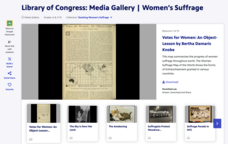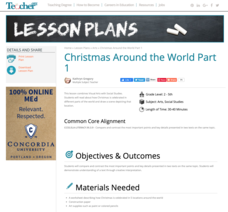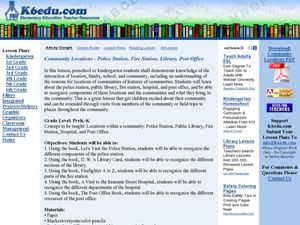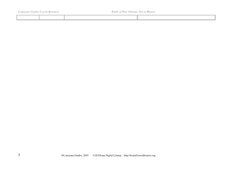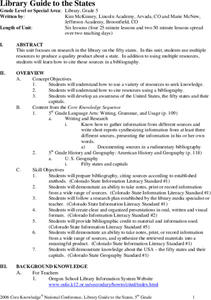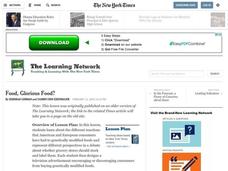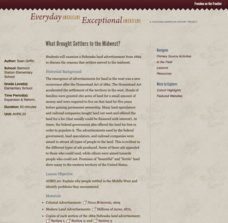Education World
Edible Resource Maps!
Young scholars discuss resource maps and examine examples from library resources. Working in groups, they create edible resource maps by drawing examples, such as popcorn on the border of Iowa and Nebraska. Then they use cookies in the...
PBS
Library of Congress: Media Gallery | Women's Suffrage
Designed to support a study of women's suffrage in the United States, a primary source document set from the Library of Congress includes images, song sheets, articles, statistical documents, political cartoon, and audio recordings...
Curated OER
Three Little Pigs: Human, Natural and Capital Resources
First and second graders will learn about natural, capital , and human resources through the story The Three Little Pigs. They will listen to the story, write down what they know about straw, wood, and brick, then complete a chart...
Curated OER
Mapping the Library
Learners compare their school library with another library such as: town library, for example, or a virtual library and identify the most important features. Students use their observations to create a map of the school library that can...
PBS
Arthur’s World Neighborhood: Bibliography for Kids
Support young learners as they expand their cultural awareness with this list of children's literature on countries from around the globe. Including both fictional and non-fictional texts. This resource will help students across the...
Facing History and Ourselves
Life for German Youth in the 1930s: Education, Propaganda, Conformity, and Obedience
The German youth faced an onslaught of propaganda when they went to school, thanks to the Nazi regime led by Hitler during World War II. Pupils relate their education experiences to German youth by analyzing primary source readings,...
Facing History and Ourselves
Responding to Difference in Democracy
Disagreements happen in a diverse democracy. It's what people do about these differences in a diverse society that the resource models. After listening to an eight-minute podcast about a woman who collaborated with people who have very...
Teacher.org
Christmas Around the World Part 1
A creative lesson shines a spotlight on Christmas celebrations throughout six different countries. Scholars read an informative text and share their new-found knowledge with their peers. After hearing about each country, pupils choose...
Facing History and Ourselves
When Differences Matter
Jane Elliott's controversial blue eyes/brown eyes experiment detailed in the film A Class Divided leads to a discussion of privilege, social power, and opportunity. Viewers note how the children react to the experiment, share their...
Middle Tennessee State University
The Invention of the Telephone
All of the people in your class would agree that life would be different without the invention of the telephone! Study Alexander Graham Bell's most famous and influential invention through the primary source document of his sketch of the...
Facing History and Ourselves
The Nazis in Power: Propaganda and Conformity
The Nazis used the power of propaganda to encourage confirmative views and the discrimination of Jews. A social studies resource illustrates these issues through discussion, image analysis, and a writing exercise.
Facing History and Ourselves
After Charlottesville: Contested History and the Fight against Bigotry
History doesn't always reflect all sides. Academics discover how the remembered history of the Civil War differs for White and African Americans. The lesson explores how Civil War monuments and celebrations have racist connotations for...
Curated OER
Community Locations - Police Station, Fire Station, Library, Post Office
Young scholars get excited about their community which can be extended through visits from members of the community or field trips. In this community helpers lesson, students demonstrate knowledge of the interaction of location, family,...
Curated OER
Through Many Lenses: How are Countries Depicted by the Media?
If you plan to utilize the ABC miniseries, "The Path to 9/11" in your classroom, consider incorporating media literacy and research skills. After (or while) learners view the series, they discuss ways information can differ from source...
Curated OER
History Did Happen in My Back Yard!
Eighth graders interpret historical evidence presented in primary resources. In this Louisiana history lesson, 8th graders research their parish history using the LOUISiana Digital Library resources. Students create multimedia...
Curated OER
Library Guide to the States
Students use a library research activity to research the fifty United States. In this library research lesson, students complete a unit of lessons where they research and study the fifty states in the United States. Students research the...
University of Pennsylvania
Mock Trial of Alfred Dreyfus
What if scholars based mock trials on history? The fourth installment of a five-part series on the Dreyfus Affair asks learners to read various pieces of evidence before conducting a mock trial for a French officer. Teams answer...
Facing History and Ourselves
Responding to Difference
James Berry's poem, "What Do We Do With a Difference?" launches a lesson that asks class members to consider the ways people respond when they encounter someone different from themselves. After analyzing the poem and discussing how they...
University of Pennsylvania
Decoding Propaganda: J’Accuse…! vs. J’Accuse…!
Reading snail mail is a great way to go back into history and to understand others' points of view. The resource, the second in a five-part unit, covers the Dreyfus Affair. Scholars, working in two different groups, read one letter and...
Curated OER
Food, Glorious Food?
How are the reactions between American and European consumers different when it comes to genetically modified foods? Use the New York Times article "Consumers in Europe Resist Gene-Altered Foods" to inform your middle schoolers about the...
Australian Government
The Great Artesian Basin
Covering 23% of the continent and holding 64,900 cubic kilometers of water, the Great Artesian Basin is the primary source of water for much of inland Australia. Using detailed student worksheets, experiments, and case studies, young...
PBS
Making Change: Revolutionary Tactics of the Civil Rights Movement
The film American Revolutionary: The Evolution of Grace Lee Boggs introduces viewers to the differing philosophies of and strategies employed by 1960s civil rights leaders such as Malcolm X and Martin Luther King, Jr. and the debate over...
Roy Rosenzweig Center for History and New Media
European Explorers
To compare how the Spanish, French, and English approached the exploration of North America, class groups examine primary source documents and become experts on one of four explorers: Francisco Coronado, Robert LaSalle, Samuel de...
Roy Rosenzweig Center for History and New Media
What Brought Settlers to the Midwest?
Drawn by promises of fertile land, thousands of settlers poured West because of the Homestead Act of 1862. By examining images of the ads that drew them westward, learners consider the motivations for movement. They also consider how the...



